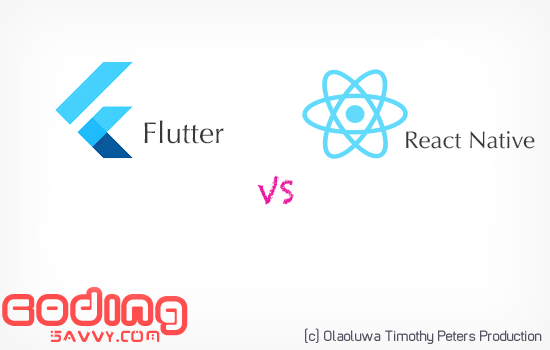About a Decayed ago, smartphones were not widely used. Since then, smartphones have become an essential tool to browse our everyday lives, Mobile Apps are the tools that made it so.
Mobile app development has evolved, Since the last decayed, Ways of developing a mobile application
has taken a new shape.
Developers want to be more efficient without compromising on speed and performance, We want to ship code more quickly by leveraging on cross-platform nature.

Should you user Flutter backed by Google or React Native backed by Facebook for your next project, Let's find out.
Flutter Pros
Performance
Flutter's engine, written primarily in C++. React Native has a Bridge that connects the Native side with Javascript, Communication between these two sides can be quiet expensive.Getting Started
Undoubtedly, Flutter excels because Google knows how to write easy and detailed documentation for their frameworks and programming languages. It’s really pleasant and useful to explore. Learning React Native require dealing with Android and iOS specific setups.Animations
Animations render more smoothly and Faster on Flutter compare to React Native Animations Library, Flutter does low-level rendering support using Google's Skia graphics libraryBuilt-in navigator
Flutter comes shipped with built-in Navigator, Route creation is very seamless, unlike React Native where you need to connect any of native navigation packages or opt for a JS base Navigation.Flutter Cons
Immaturity
React Native has been around longer than Flutter and RN has a larger community and grows rapidly more than Flutter as at the moment, It's safe to say React Native is more mature that Flutter as at the time of this posting.Darts
Developers are like "Did you say Darts?", Darts has been around for a while, It was meant to be a replacement for Javascript at Google for dynamic rendering but OOP can be difficult to learn for a beginner with its inheritance, polymorphism and all OOP hurts, You need to write more to get things done in Darts.Templating
Unlike React Native there is no division of Darts files into the template therefore data management and styling becomes unpleasant for Developers.Animating
Flutter animation might be smoother but it requires more to get simple animations done in Flutter compare to React Native.React Native Pros
React
React is simple yet powerful and scalable web Framework. React make it easy to maintain large codebases. Here are Some of the things it brought to React Native are:Components: React Components enforce separation of concerns with well-defined props and state. This is a major contributor to React’s scalability.
Simplified Lifecycles: Android and, to a slightly lesser extent, iOS lifecycles are notoriously complex. Functional reactive React components fundamentally solve this problem and made learning React Native dramatically simpler than learning Android or iOS.
Declarative: The declarative nature of React helped keep our UI in sync with the underlying state.
IDE's
React Native has existed for long and it's now supported by almost every available IDE. Flutter is currently supported by Android Studio, VS Code, and IntelliJ IDEA.Javascript
If not the easiest programming language, Javascript is beginner friendly compare to Darts and most developers coming from the web can ease into mobile development in React Native.App Size
Though it's faster Dart Bridge is bigger than React Native bridge, If two apps were built with equal functionality on Flutter and React Native, The size ratio of the app bundle, in the end, will always favor React Native.Flexbox
React Native handles layout with Yoga, a cross-platform C library that handles layout calculations via the flexbox API. Most Web App developers are used to using Flexbox, This makes it easy for developers to build layouts in React Native.Development Time
Because of Maturity and Community Modules, Developer skills and JavaScript, App Development in with React Native can be faster than Flutter.Redux
Though Redux usage is optional for React, Redux is mostly used to prevent the UI from ever getting out of sync with state and enabled easy data sharing across screens.React Native Cons
Performance
One of the largest concerns around React Native was its performance. However, It's been worked on. moving business logic and layout off of the main thread actually improves render performance in many cases.JavaScript Tooling
JavaScript is an untyped language. The lack of type safety was both difficult to scale and became a point of contention for mobile engineers used to typed languages who may have otherwise been interested in learning React Native.Initial Render Time
Unlike with native screens, rendering React Native requires at least one full main thread -> js -> yoga layout thread -> main thread round trip before there is enough information to render a screen for the first time.Upgrading React Native
Although most React Native upgrades were trivial, there were a few that wound up being painful. In particular, it was nearly impossible to use React Native 0.43 (April 2017) to 0.49 (October 2017) because it used React 16 alpha and beta.Personal Recommendation to Mobile App Developers
Personally, I will recommend to a developer base on their skill-sets, the project requirement and Timeline. You only have to work with what will make you more efficient, give you less headache and consume less development time. However, If you are totally new to mobile app development and has no prior experience with JavaScript, I will recommend you go with Flutter. Meanwhile, If you have prior experience with React, Javascript, Android Development or iOS Development, I will recommend you go for React Native.
Thanks!
Your feedback helps us improve tutorials.



No comments:
Post a Comment